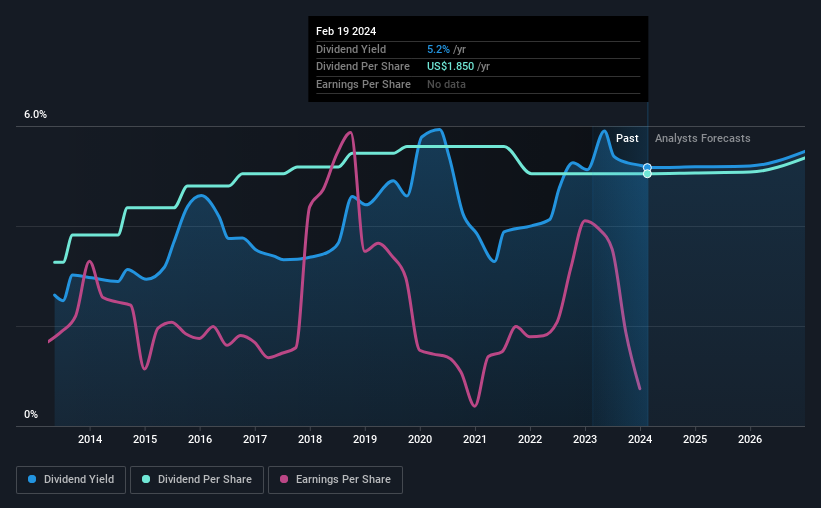
The board of International Paper Company (NYSE:IP) has announced that it will pay a dividend on the 15th of March, with investors receiving $0.4625 per share. Based on this payment, the dividend yield on the company's stock will be 5.2%, which is an attractive boost to shareholder returns.
View our latest analysis for International Paper
International Paper's Dividend Is Well Covered By Earnings
While it is great to have a strong dividend yield, we should also consider whether the payment is sustainable. Before making this announcement, the company's dividend was higher than its profits, and made up 93% of cash flows. This indicates that the company could be more focused on returning cash to shareholders than reinvesting to grow the business.
According to analysts, EPS should be several times higher next year. Assuming the dividend continues along recent trends, we estimate that the payout ratio could reach 56%, which is in a comfortable range for us.

International Paper Has A Solid Track Record
The company has an extended history of paying stable dividends. Since 2014, the dividend has gone from $1.20 total annually to $1.85. This implies that the company grew its distributions at a yearly rate of about 4.4% over that duration. While the consistency in the dividend payments is impressive, we think the relatively slow rate of growth is less attractive.
The Dividend Has Limited Growth Potential
Investors who have held shares in the company for the past few years will be happy with the dividend income they have received. However, things aren't all that rosy. Earnings per share has been sinking by 27% over the last five years. Such rapid declines definitely have the potential to constrain dividend payments if the trend continues into the future. It's not all bad news though, as the earnings are predicted to rise over the next 12 months - we would just be a bit cautious until this becomes a long term trend.
The Dividend Could Prove To Be Unreliable
In summary, while it's good to see that the dividend hasn't been cut, we are a bit cautious about International Paper's payments, as there could be some issues with sustaining them into the future. In the past the payments have been stable, but we think the company is paying out too much for this to continue for the long term. This company is not in the top tier of income providing stocks.
Market movements attest to how highly valued a consistent dividend policy is compared to one which is more unpredictable. Still, investors need to consider a host of other factors, apart from dividend payments, when analysing a company. To that end, International Paper has 4 warning signs (and 2 which make us uncomfortable) we think you should know about. Is International Paper not quite the opportunity you were looking for? Why not check out our selection of top dividend stocks.
New: AI Stock Screener & Alerts
Our new AI Stock Screener scans the market every day to uncover opportunities.
• Dividend Powerhouses (3%+ Yield)
• Undervalued Small Caps with Insider Buying
• High growth Tech and AI Companies
Or build your own from over 50 metrics.
Have feedback on this article? Concerned about the content? Get in touch with us directly. Alternatively, email editorial-team (at) simplywallst.com.
This article by Simply Wall St is general in nature. We provide commentary based on historical data and analyst forecasts only using an unbiased methodology and our articles are not intended to be financial advice. It does not constitute a recommendation to buy or sell any stock, and does not take account of your objectives, or your financial situation. We aim to bring you long-term focused analysis driven by fundamental data. Note that our analysis may not factor in the latest price-sensitive company announcements or qualitative material. Simply Wall St has no position in any stocks mentioned.
About NYSE:IP
International Paper
Produces and sells renewable fiber-based packaging and pulp products in North America, Latin America, Europe, and North Africa.
Adequate balance sheet average dividend payer.


